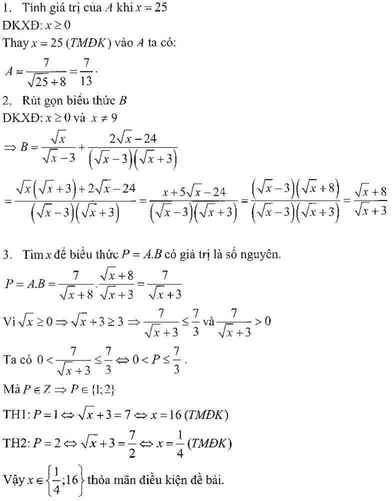
Hãy nhập câu hỏi của bạn vào đây, nếu là tài khoản VIP, bạn sẽ được ưu tiên trả lời.


a: ĐKXĐ: \(\left\{{}\begin{matrix}x\ge0\\x\ne1\end{matrix}\right.\)
b: Ta có: \(A=\left(\dfrac{x+2}{x\sqrt{x}-1}+\dfrac{\sqrt{x}}{x+\sqrt{x}+1}+\dfrac{1}{1-\sqrt{x}}\right):\dfrac{\sqrt{x}-1}{2}\)
\(=\dfrac{x+2+x-\sqrt{x}-x-\sqrt{x}-1}{\left(\sqrt{x}-1\right)\left(x+\sqrt{x}+1\right)}\cdot\dfrac{2}{\sqrt{x}-1}\)
\(=\dfrac{2}{x+\sqrt{x}+1}\)
c: Ta có: \(x+\sqrt{x}+1>0\forall x\) thỏa mãn ĐKXĐ
\(\Leftrightarrow\dfrac{2}{x+\sqrt{x}+1}>0\forall x\)


Ta có \(X-2\sqrt{X}+3\)
\(=\sqrt{X}^2+2\times\sqrt{X}\times1+1^2+2\)
\(=\left(\sqrt{X}+1\right)^2+2\)
Ta lại có \(\left(\sqrt{X}+1\right)^2\ge0,\forall X\)
\(\Rightarrow P\le3.\)Dấu"=" xảy ra khi \(\sqrt{X}+1=0\)\(\Leftrightarrow X=1\)
Vậy MaxP=3<=>X=1
Ta có X-2\sqrt{X}+3X−2X+3
=\sqrt{X}^2+2\times\sqrt{X}\times1+1^2+2=X2+2×X×1+12+2
=\left(\sqrt{X}+1\right)^2+2=(X+1)2+2
Ta lại có \left(\sqrt{X}+1\right)^2\ge0,\forall X(X+1)2≥0,∀X
\Rightarrow P\le3.⇒P≤3.Dấu"=" xảy ra khi \sqrt{X}+1=0X+1=0\Leftrightarrow X=1⇔X=1
Vậy Max P=3<=>X=1

1:
\(A=\dfrac{15\sqrt{x}-11-\left(3\sqrt{x}-2\right)\left(\sqrt{x}+3\right)-\left(2\sqrt{x}+3\right)\left(\sqrt{x}-1\right)}{\left(\sqrt{x}+3\right)\left(\sqrt{x}-1\right)}\)
\(=\dfrac{15\sqrt{x}-11-3x-9\sqrt{x}+2\sqrt{x}+6-2x+2\sqrt{x}-3\sqrt{x}+3}{\left(\sqrt{x}+3\right)\left(\sqrt{x}-1\right)}\)
\(=\dfrac{-5x+7\sqrt{x}-2}{\left(\sqrt{x}+3\right)\left(\sqrt{x}-1\right)}=\dfrac{-5\sqrt{x}+2}{\sqrt{x}+3}\)
3: A nguyên
=>-5căn x-15+17 chia hết cho căn x+3
=>căn x+3 thuộc Ư(17)
=>căn x+3=17
=>x=196

a: Ta có: \(A=\left(1-\dfrac{2\sqrt{x}-2}{x-1}\right):\left(\dfrac{1}{\sqrt{x}+1}-\dfrac{\sqrt{x}}{x\sqrt{x}+1}\right)\)
\(=\dfrac{x-1-2\sqrt{x}+2}{x-1}:\dfrac{x-\sqrt{x}+1-\sqrt{x}}{\left(\sqrt{x}+1\right)\left(x-\sqrt{x}+1\right)}\)
\(=\dfrac{x-\sqrt{x}+1}{\sqrt{x}-1}\)

\(\sqrt{4x+2\sqrt{x}+1}\le\sqrt{4x+\dfrac{1}{2}\left(2^2+x\right)+1}=\sqrt{\dfrac{9x}{2}+3}\)
\(=\dfrac{1}{\sqrt{21}}.\sqrt{21}.\sqrt{\dfrac{9x}{2}+3}\le\dfrac{1}{2\sqrt{21}}\left(21+\dfrac{9x}{2}+3\right)=\dfrac{1}{2\sqrt{21}}\left(\dfrac{9x}{2}+24\right)\)
Tương tự và cộng lại:
\(A\le\dfrac{1}{2\sqrt{21}}\left(\dfrac{9}{2}\left(x+y+z\right)+72\right)=3\sqrt{21}\)
\(A_{max}=3\sqrt{21}\) khi \(x=y=z=4\)
\(A=1\sqrt{4x+2\sqrt{x}+1}+1.\sqrt{4y+2\sqrt{y}+1}+1\sqrt{4z+2\sqrt{z}+1}\)
\(\le\sqrt{\left(1+1+1\right)\left(4\left(x+y+z\right)+2\left(\sqrt{x}+\sqrt{y}+\sqrt{z}\right)+3\right)}\)
\(=\sqrt{3.\left[51+\dfrac{4\left(\sqrt{x}+\sqrt{y}+\sqrt{z}\right)}{2}\right]}\)
\(\le\sqrt{3.\left[51+\dfrac{x+y+z+12}{2}\right]}\)
\(=\sqrt{189}\)
Dấu "=" xảy ra <=> x = y = z = 4

ta co:\(\left(1+1\right)\left(x^2+2-x^2\right)>=\left(x+\sqrt{2-x^2}\right)^2\) (theo bdt bunhiacopxki)
=>\(4>=\left(x+\sqrt{2-x^2}\right)^2\)
=>\(2>=x+\sqrt{2-x^2}\)
=>A max=2 khi va chi khi \(x=\sqrt{2-x^2}\Rightarrow2x^2=2\Rightarrow x=1\)